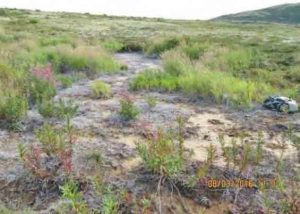
(Anchorage, AK) – When the U.S. Environmental Protection Agency, (EPA), barred the U.S. Army Corps of Engineers, (Corps), from issuing any permit under Section 404 of the Clean Water Act for 309-square-miles of State land in Southwest Alaska, it effectively confiscated State property and created a de facto national park. Today Alaska Attorney General Treg Taylor filed a brief, calling on the U.S. Supreme Court to order the EPA to correct its wrongdoing.
Section 404 of the Clean Water Act requires the Corps to issue a permit before any dredged or fill material can be discharged into waters of the United States. In January 2023, the EPA issued its final determination, known as a 404(c) veto, that not only specifically prohibited permitting the Pebble Mine according to a 2020 mining plan, but also restricted any future permit to construct or operate a mine in a 309-square-mile area surrounding the Pebble deposit. The EPA action usurps the State’s ability and responsibility to protect its own natural resources.
“An original action, where a case is heard directly by the Supreme Court instead of first progressing through the lower courts, is an extraordinary ask, but it’s appropriate given the extraordinary decision being challenged,” said Attorney General Treg Taylor.
“No other State in the union depends so greatly on its lands for its prosperity,” the brief contends. “Unlike most States, Alaska is constitutionally required to protect its natural resources. The State must provide for the “conservation of all natural resources belonging to the State, including land and waters, for the maximum benefit of its people.”” Nonetheless, EPA made its final determination under Section 404(c) of the Clean Water Act before the State processes could work through the Pebble Project.
“Our constitution is clear: Alaska is responsible for utilizing, developing, and conserving all of the State’s natural resources for the maximum benefit of its people,” said Alaska Governor Mike Dunleavy.“Bureaucrats in Washington D.C. are exercising unbridled and unlawful power to choke off any further discussion on this important decision affecting so many Alaskans.”
“The preemptive veto is alarming,” saidAttorney General Taylor. “If EPA can rely on undefined terms and subjective standards instead of sound science to bypass the regular State and federal permitting processes here, it can do it anywhere, from large mining projects such as this, down to a family building their dream home. It’s an indefensible and unprecedented power grab that the U.S. Supreme Court should find unlawful.”
“Alaska has some of the most robust environmental permitting requirements in the world ensuring development of critical natural resources occurs side-by-side with protection of human health and the environment,” said Commissioner of the Alaska Department of Environmental Conservation Jason Brune. “Congress intended Alaska to have primary responsibility over land and resource management decisions under the Clean Water Act’s framework of cooperative federalism. EPA robbed us of this opportunity.”
Like the State’s environmental permitting processes, “Alaska’s Title 16 permitting process is designed to ensure conservation of fish and fish habitat. But these statutory protections were flouted by EPA before Alaska’s expert habitat and fish biologists had the opportunity to weigh in,” according to Alaska Department of Fish & Game Commissioner Doug Vincent-Lang.“The State’s career experts should be allowed to do their job without having Washington bureaucrats swooping in to prohibit an action before we even received a permit application.”
“The Alaska Statehood Compact and Cook Inlet Land Exchange were meant to ensure the State of Alaska would have the opportunity to responsibly develop its resources under its robust permitting regime,” said Commissioner of the Alaska Department of Natural Resources John Boyle. “EPA cannot unilaterally ignore these monumental Congressional actions.”
“The State seeks a declaration that the EPA’s veto is unlawful and an order setting it aside and enjoining its enforcement,” the brief requests. “Alternatively, the State seeks damages for a breach of contract and just compensation for a taking.”
- Read the brief to support a bill of complaint (PDF 559KB).
# # #
